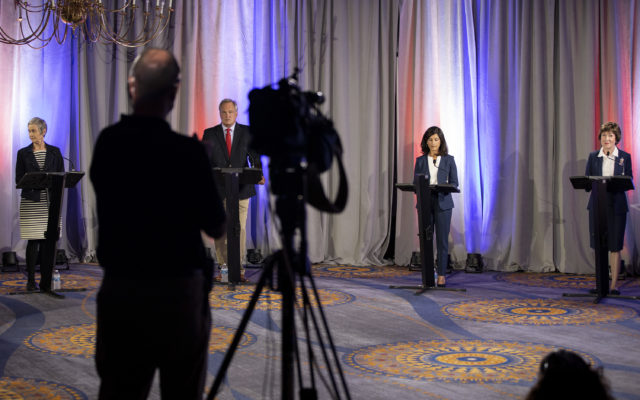
Susan Collins and Sara Gideon clash over health care and Trump in first US Senate debate
U.S. Sen. Susan Collins and House Speaker Sara Gideon clashed over health care, and President Donald Trump in the first debate of their massive 2020 race on Friday, while independent Lisa Savage looked to establish progressive credentials and fellow longshot Max Linn squabbled with moderators.
The debate, hosted by the Bangor Daily News, News Center Maine and the Portland Press Herald, was the first of several ahead of the November election, which has shaped up to be the most competitive of the fourth-term incumbent’s 24-year career in the Senate.
The contentious campaign has attracted tens of millions of dollars in out-of-state money. Collins, who has seen her popularity decline steadily since 2017, became a national target after voting to confirm Supreme Court Justice Brett Kavanaugh two years ago. Both parties see Maine as a pivotal state in determining control of the Senate in 2021. An AARP Maine poll published Thursday found Gideon, a Democrat, virtually tied with Collins.

Candidates prepare to debate during Decision Maine in Portland on Sept. 11. (Brianna Soukup | Portland Press Herald)
The candidates clashed on health care, with Gideon criticizing Collins for her vote for a 2017 Republican tax bill that is the basis of a lawsuit against the Affordable Care Act while suggesting a public option and using Medicare to negotiate drug prices.
Collins criticized Gideon’s proposed public-option plan, saying it would create financial challenges for rural hospitals, though the Democrat tries to account for that in her plan. Collins said price transparency was key to fixing health care. Savage, a former member of the Green party, pitched a single-payer Medicare for All plan.
On the economy, Collins touted her work on the Paycheck Protection Program, which provided roughly 28,000 Maine small businesses with $2.3 billion in forgivable loans earlier in the coronavirus crisis. Gideon called for improved digital infrastructure and job training, and said federal leadership on addressing coronavirus would help the economy recover sooner.
“I think Joe Biden should be our leader to help us through with public health and rebuilding the economy,” she said, challenging Collins repeatedly to say whether she supports Trump.
Collins once again declined to answer whether she will vote for Trump, who she famously denounced ahead of the 2016 election, saying voters did not need her advice on how to vote in the presidential election.
The debate came days after released tapes showed that Trump told journalist Bob Woodward as early as February that he thought the coronavirus was “really bad” even as he continued to say publicly that he thought it would go away. Asked about the president’s comments, Collins said he should have been more “straightforward” but declined to criticize Trump beyond that.
The race is the most expensive in Maine’s history, with the campaigns collectively spending more than $40 million as of June 30, and even more in outside money already pouring into the state. Collins decried the out-of-state interests funding ads against her.
“I’m sure that all of you out there are as sick of it as I am,” Collins said.
Gideon criticized Collins’ vote against the DISCLOSE Act, which would have tightened some disclosure requirements, while Collins said she voted against the bill because it contained loopholes. The Republican attacked Gideon for corporate money her former state leadership PAC took, while Gideon criticized money Collins’ campaign has received from corporate PACs.
Savage, meanwhile, said candidates could solve the issue of money in politics by refusing to accept money from PACs and lobbyists, saying she — the only one of the four candidates who is not a millionaire — better reflected the “values and needs” of most people.
Linn squabbled with moderators early in the debate, refusing to answer questions directly, saying he needed to work “outside the box” due to massive fundraising from Collins and Gideon. Asked once about the economy, he talked about the Central Maine Power corridor instead, and said he would be launching a lawsuit against the company next week.
Linn was also critical of Gideon and Collins, at one point accusing both of seeking to defund the police, which neither have supported. Both replied by saying so, with Collins citing her recent endorsement from the Maine Fraternal Order of Police.
There were few other moments where Collins and Gideon were on the same side. Gideon repeatedly highlighted Collins for her lack of public clarity on Trump, saying Maine people “want to know who their senator thinks should be leading us” and criticizing the Republican senator over votes to confirm judges deemed unqualified by the American Bar Association.
Collins defended her Kavanaugh vote and others, saying she had been “remarkably consistent” while decrying the politicization of the Supreme Court. She asked Gideon whether she would have voted to confirm Chief Justice John Roberts, who was appointed in 2005. Gideon paused and did not have a ready answer, saying she would need to review his record.